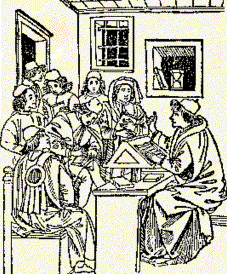Shakespeare at grammar school
After two years in petty school, Shakespeare would have advanced to the grammar school, where he would have studied Latin grammar*.*
It must have been during his time at this school that he learned to look beyond the mechanics of language to the beauty of literature. He would have studied Ovid*, who remained a great favourite throughout his life, and he would have read Plautus*, the most admired writer of Latin comedy. He would also have been introduced to rhetoric and some logic through the writings of Cicero* and Quintilian*, as well as Latin history, philosophy and perhaps some rudimentary Greek.
Although boys normally attended grammar school until age 15 or 16, Shakespeare may have been forced to leave school as early as 1577, at age 13, because of his father's financial difficulties.
There is no record of Shakespeare attending university.
Footnotes
-
Latin grammar
In The Merry Wives of Windsor, William has a lesson in grammar from the Welsh teacher, Sir Hugh Evans, while Mistress Quickly looks on--and Shakespeare takes the opportunity for some bawdy punning:
Evans: What is your genetive case plural, William? . . .
William: Genetive, horum, harum, horum.
Quickly: Vengeance of Jenny's case! Fie on her! Never name her child, if she be a whore.
(4.1.58-64) -
A glossary
- Ovid
- The collection of myths elegantly retold in Ovid's Metamorphoses was used by Shakespeare from the early Titus Andronicus to the late play The Tempest.
- Plautus
- Along with Terence, the best known of the Roman writers of comedy. Shakespeare used several of Plautus' plays as sources, notably in The Comedy of Errors.
- Cicero
- A Roman orator, philosopher, and letter-writer famed for his prose style. He lived in the time of Julius Caesar and Mark Antony, and was one of those "pricked" for death after the assassination of Caesar (see Julius Caesar, 4.1)
- Quintilian
- Of a later generation than Cicero, Quintilian was also an orator, noted especially for his written works on rhetoric, where he set a standard for taste in Latin prose style.
